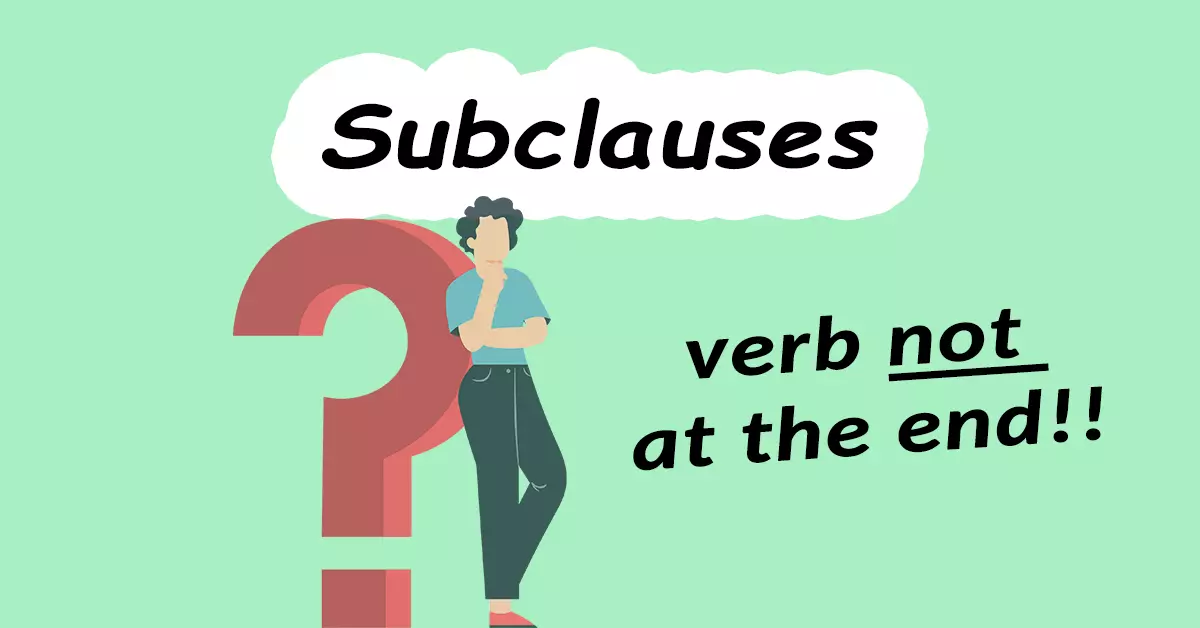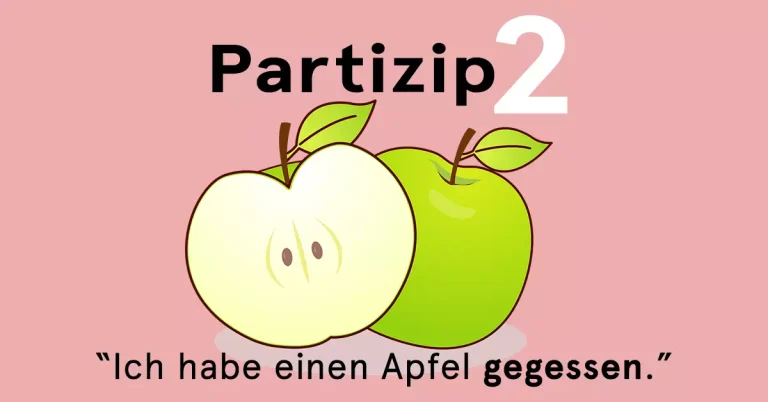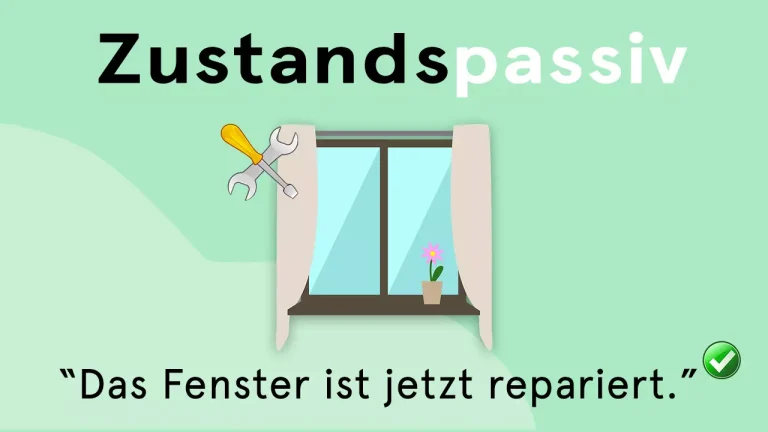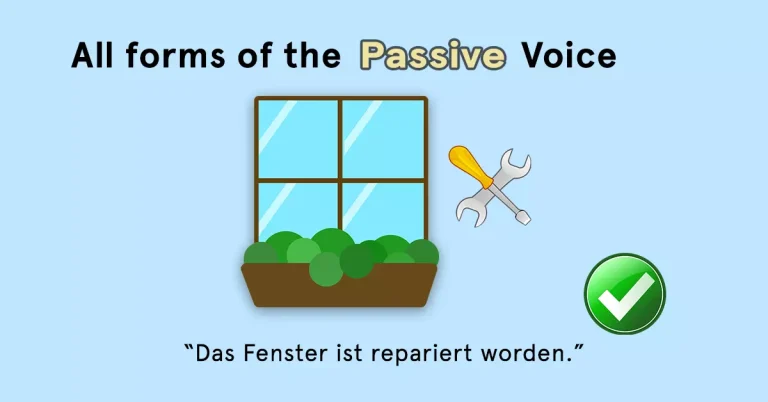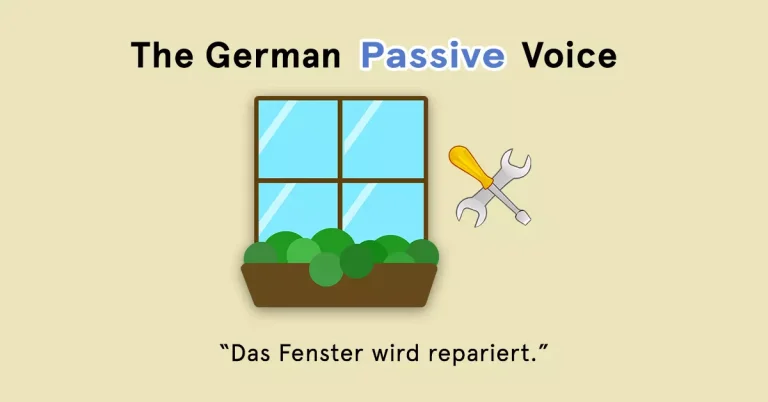So you’ve just come across a German subclause in which the verb is not at the end – against all the rules you’ve learned? This article will tell you all you need to know about such sentences.
When is the finite verb not at the end of a German subordinate clause? This happens in subordinate clauses with an “Ersatzinfinitiv“. The “Ersatzinfinitiv“ is used instead of the past participle form of the modal verbs (können, müssen etc.) and the auxiliary verbs lassen, sehen and hören when these verbs occur in the compound tenses (perfect, past perfect and Konjunktiv 2 of the past).
Example: subclause, but verb not at the end
Let me show you what I mean. In sentences (1) and (2) the conjugated (finite) verb is at the end of the subclause, as you would expect. In the subclause of (3), however, it is not at the end because the conjugated verb is “hat” which here is used to form the perfect tense.
(1) Er kommt heute nicht, weil sein Fahrrad kaputt ist.
He’s not coming today because his bike is broken.
(2) Er kam heute nicht, weil er sein Fahrrad reparieren musste.
He didn’t come today because he had to repair his bike.
(3) Er kam heute nicht, weil er sein Fahrrad hat reparieren müssen.
He didn’t come today because he had to repair his bike.
Perfekt with a modal verb
To explain this exception to you, I should first of all show the formation of the perfect with a modal verb.
(4) Er hat sein Fahrrad reparieren müssen. (not: gemusst!)
In such a setting (modal verb + Perfekt tense), the perfect is formed with
- the auxiliary verb haben,
- the infinitive of the modal verb (not with the Partizip 2!)
- and the infinitive of the full verb.
This infinitive (müssen) replaces the expected Partizip 2 form, as it were, and it’s therefore called Ersatzinfinitiv (literally “replacement infinitive”).
The infinitive of the full verb (reparieren) is not a surprise as you always get modal verbs with an infinitive form. But the infinitive of the modal verb (müssen) could be surprising to you because the (usual) formula for the Perfekt tense: haben/sein + Partizip 2.
If such a construction with two infinitives in a row occurs in a subclause, the conjugated verb doesn’t go to the end but at the beginning of the verb group:
(5) …, weil er sein Fahrrad hat reparieren müssen.
I know what you’re thinking now: Why not simply use the Präteritum tense instead? Isn’t the Präteritum a lot more common with modal verbs anyway?
Well, you’re right! But there is no alternative for two other verb forms where the same thing happens: Plusquamperfekt and the Konjunktiv 2 der Vergangenheit in combination with a modal verb. And here, there is no way around it as there are no alternatives.
Plusquamperfekt with a modal verb
Main clause:
(6) Er hatte sein Fahrrad reparieren müssen. (not: gemusst!)
Subclause:
(7) …, weil er sein Fahrrad hatte reparieren müssen.
Konjunktiv 2 der Vergangenheit with a modal verb
Main clause:
(8) Er hätte sein Fahrrad reparieren müssen. (not: gemusst!)
Subclause:
(9) …, weil er sein Fahrrad hätte reparieren müssen.
It kind of makes sense that the same phenomenon can be observed with the Plusquamperfekt and the Konjunktiv 2 der Vergangenheit as their construction is very similar: You need a form of haben or sein (only haben for modal verbs) in combination with a Partizip 2 form.
3 verbs? How about 4?
In the above examples there are 3 verbs forms, which admittedly can be a bit tricky a first. If you’ve understood the principle, you’re ready for something even “crazier”. How about 4 verb forms? 🙂
Perfekt + Modalverb + Passiv:
(10) …, weil das Auto hat gestohlen werden können.
Plusquamperfekt + Modalverb + Passiv:
(11) …, weil das Auto hatte gestohlen werden können.
Konjunktiv 2 der Vergangenheit:
(12) …, weil das Auto hätte gestohlen werden können.
Note: You can check out my overview of all passive forms, explanations and translations.
Not just modal verbs
This also happens with the verbs: lassen, sehen and hören. They can be used with an infinitive. if this occurs in the Perfekt, Plusquamperfekt and the Konjunktiv 2 der Vergangenheit they are used with the Ersatzinfinitiv (just like with modal verbs).
In the subordinate clause, the conjugated verb (a form of haben) is again at the beginning of the verb group.
(13) …, weil er das Auto hat kommen sehen.
(14) …, dass er sein Kind sonst nicht hätte fernsehen lassen.
(15) …, weil er den Zug hatte kommen hören.
Summary
Use the infinitive (instead of the Partizip 2 form) for the modal verbs (and lassen, hören, sehen) in the following settings:
- Perfekt + Modalverb (not really needed, simply use the Präteritum instead)
- Plusquamperfekt + Modalverb
- Konjunktiv 2 der Vergangenheit+ Modalverb
(16) Er hatte die Hausaufgaben machen müssen. (not: gemusst!)
If these occur in subclause, always put the conjugated verb (a form of haben) at the beginning the verb group (before the two infinitives).
(17) …, obwohl er die Hausaufgaben hatte machen müssen. (not: machen müssen hatte!)
- When did you first learn about this?
- Was/is this confusing for you?
- Or maybe you have a question on the matter? Feel free to write a comment!
